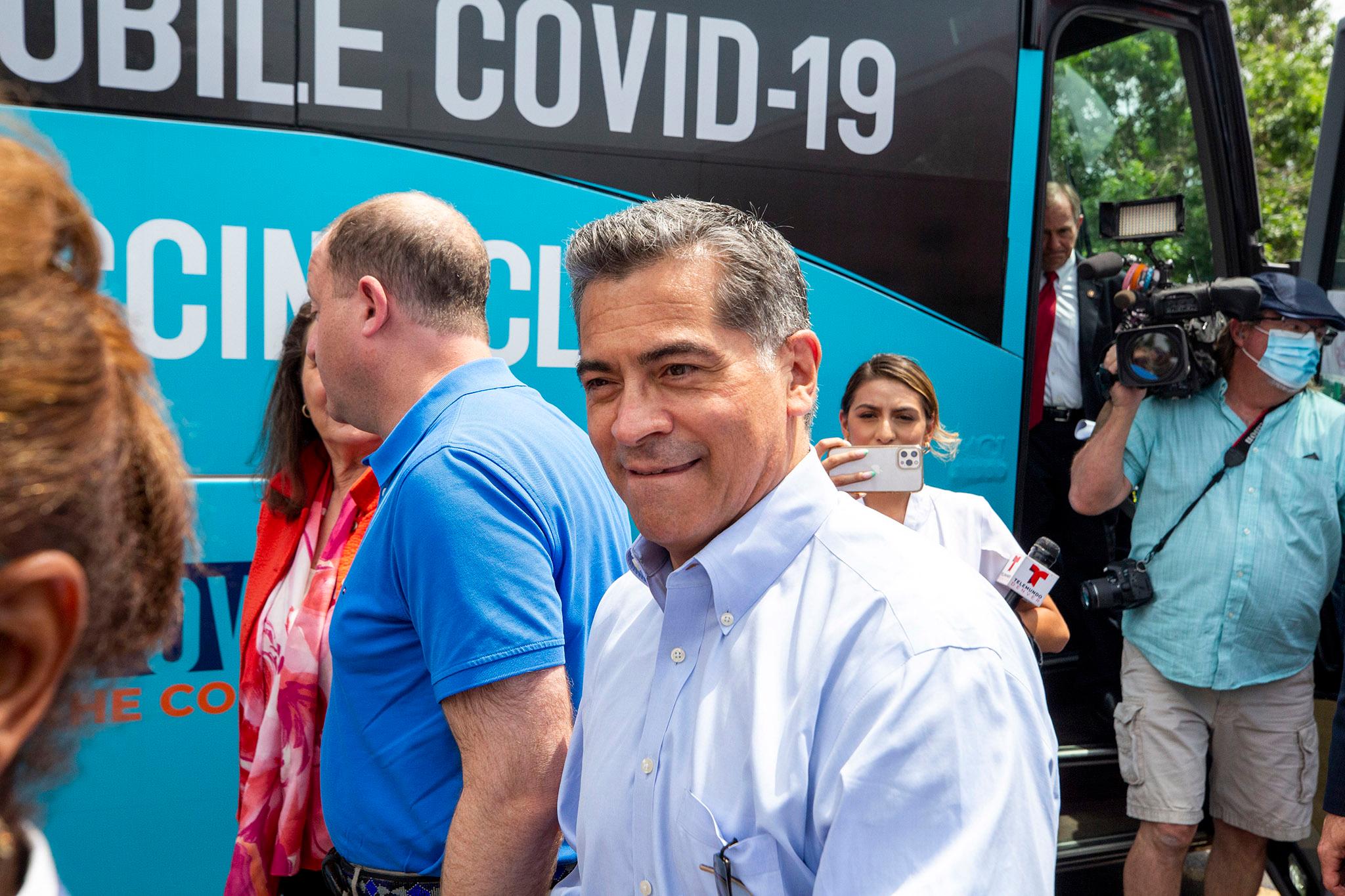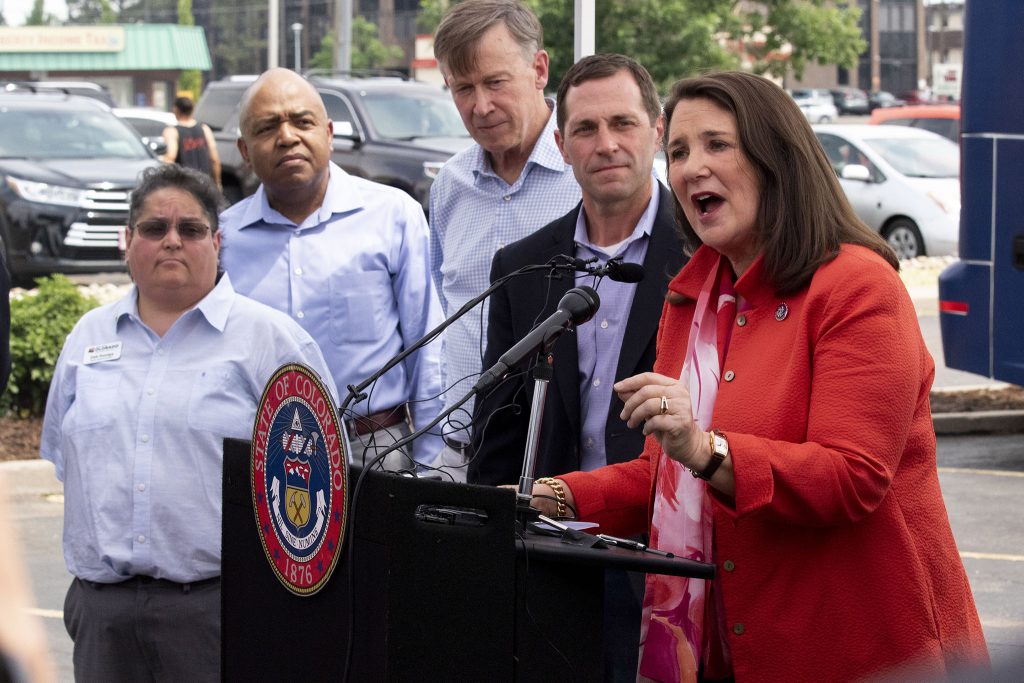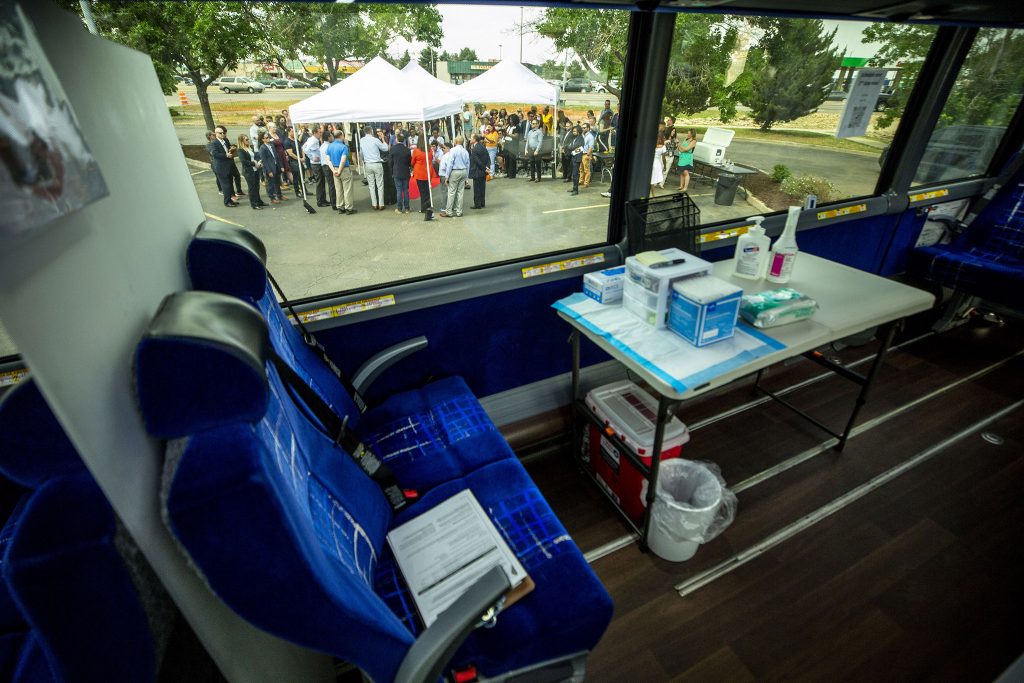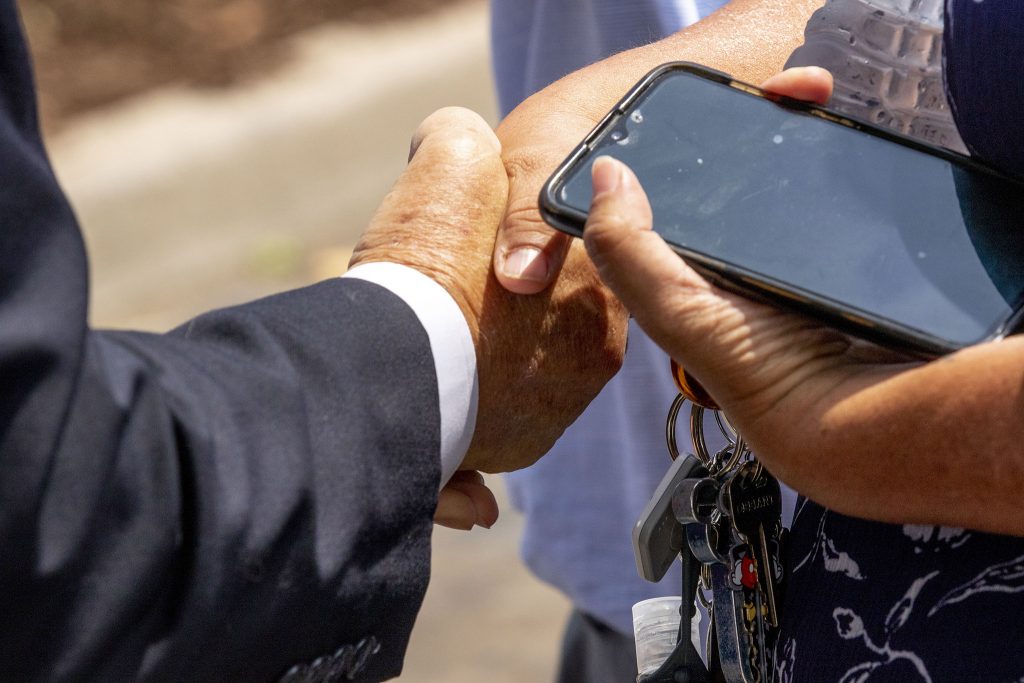
Colorado Democrats assembled many of their highest profile leaders Friday in metro Denver, joined by the Biden Administration’s top health official, to make the case to the state’s Latino residents to get vaccinated against the coronavirus.
Latinos have seen higher levels of COVID-19 infections and hospitalizations than other populations in Colorado, but their vaccination rates trail other groups.
U.S. Secretary of Health and Human Services Xavier Becerra was the headliner at the afternoon press conference at a vaccination site in the parking lot of Chambers Plaza on East Colfax in Aurora. Becerra, with a pair of Colorado vaccine buses in the background, spotlighted efforts by the Biden Administration to boost those numbers at the event, which was heavily attended by Spanish-language news outlets.
He was flanked by the governor and nearly every Democrat in the state’s Congressional delegation, a gathering that likely couldn’t have happened just a few months ago unless it was on Zoom, highlighting the societal changes coronavirus vaccines have brought.

After responding to several questions in Spanish, Becerra, a former California attorney general, 12-term Congressman and the first Latino HHS secretary in U.S. history, switched to English.
“There are still too many families that have not been vaccinated, too many families in our Black community, and our Latino community, in our immigrant communities, who have not. And we need to get to them,” he said, “And the beautiful thing is, I was saying in Spanish, is that we have a president of the United States who has said the vaccines are safe, they're effective, and they're free.”
Becerra said those communities are not accustomed to hearing that they're not going to get charged for services and treatments, or see “some gimmick” involved in such offers, and “they're often the last to be served and the first to be exploited.”
He praised Colorado’s handling of the vaccine push, saying “if everybody did it the way that Colorado did it, we'd be in pretty good shape.” Colorado is a few percentage points above the U.S. averages for people who are fully vaccinated and those who have received one shot, though inequities in Colorado’s distribution remain.
Earlier in his visit, Becerra told reporters he worries about groups and states with lower vaccination rates particularly considering variant strains, like the highly transmissible Delta variant, first found in India, now dominate cases in the U.S. He said if that trend persists, the trajectory of the pandemic could darken in the fall or winter, especially if even more transmissible variants take hold.
“It's becoming increasingly clear that everyone should be vaccinated, not just because it's the right thing to do,” Becerra said. “Because we don't want to revert back to the bad old days of having to close down everything.”
Despite the presence of variants here, the numbers of Coloradans getting COVID-19 and getting hospitalized have been trending in a positive direction for weeks. On Friday, 333 people were hospitalized with confirmed COVID-19 cases, well off the peak of nearly 2000 in early December and approaching last summer’s low number.
But perhaps no demographic has been harder to get vaccinated than the more than 20 percent of Coloradans who identify as Hispanic, the term officially used in the U.S. Census. Just about 10 percent of the state’s doses have gone to Hispanic residents, according to the state’s vaccination dashboard. That’s despite a full-court press by the state and community groups to deploy pop-up clinics, place Spanish-language ads and undertake a recent push to pair vaccination sites with community events.
Slightly less than half of Colorado’s Latino population is now vaccinated, well below white residents, according to Deb Suniga, the deputy outreach director for the state’s Latino COVID Equity Task Force. She thought Becerra’s visit, and his communicating directly through Spanish-language media, would help the cause with Latinos, who she said are getting a steady diet of disinformation and misleading claims about the vaccines.
“Without the education piece, people are afraid,” said Suniga, who has done a lot of her work in northern Colorado and Weld County, which have large Latino populations. “That's why it's so important. That's why (Becerra) was telling them, ‘We've got to get those shots in the arm.’”

Governor Jared Polis singled out another approach, vaccinations on wheels, via buses like the ones prominently parked at the event. He said the state started with just a pair of them, but has expanded that number to nine, “so we could go directly to hard to reach areas and rural areas and underserved urban areas to help meet people where they are, to get them safely vaccinated.”
Rep. Jason Crow, a Democrat who represents the district where the event was held, pointed to a food market under tents behind the vaccine buses. “You see how hard people in this community are working,” he said, noting some work shifts that start early in the morning or end late at night.
“We have to meet people where they are. Right? Cause not everybody can drive 20 miles to the local clinic,” Crow said. “So we're driving to them because there are people working really hard that deserve some equity when it comes to the distribution of vaccination. And that's what we're trying to do.”
Becerra’s visit is timed to boost rates nationally ahead of a July 4 deadline set by his boss, President Joe Biden, to vaccinate 70 percent of the U.S. population. The trip also happened to be a day after President Biden signed into law a new federal holiday, Juneteenth, to commemorate the end of chattel slavery in the U.S., and Becerra highlighted historic disparities in his time in metro Denver. In the morning, he got a tour of the Center for African American Health, a resource center dedicated to providing families with resources to support them in overcoming the “root causes of health problems.”
The center’s CEO and executive director Deidre Johnson said when it comes to highlighting health inequities, Becerra’s visit sent “a huge message of how important it is.”
Still, Johnson worried about some neighborhood vaccine clinics closing too soon due to a lack of demand. She urged local leaders, who are able to operate them thanks to federal pandemic funding, not to close them. “I don't want that to happen because it's going to take time and we want to make sure we can guarantee access once people are ready to get vaccinated,” Johnson said.

The secretary’s visit also came just one day after the U.S. Supreme Court upheld the landmark Affordable Care Act, which Becerra helped craft while in Congress and then defend as California’s attorney general. For years, Republicans, arguing the ACA, also called Obamacare, is too expensive and unconstitutional, have tried to scuttle it. Six-hundred thousand Coloradans and 21 million Americans have been able to get health insurance through the ACA. And Friday, Democrats were heaving a sigh of relief.
“Yesterday was a great victory for the American people,” said Sen. Michael Bennet. “It would not have happened without Secretary Becerra.”
“A loss of the Affordable Care Act before the Supreme Court would have crippled the progress we've made,” Becerra said. “But what I can tell you is this seven to two is an exclamation point behind the Affordable Care Act being the law of the land.” The justices kept it intact on a 7-2 vote.
Early on Friday, Becerra spoke with Polis about the state’s new law establishing a public health insurance option, which is one idea Democrats have talked about promoting nationally to build on the ACA.








